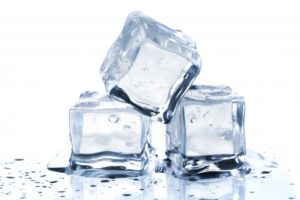
Chewing on ice might seem like a harmless habit, especially on a hot day or after finishing a refreshing drink. In fact, many people do it without thinking, whether out of boredom, stress, or simply because they enjoy the crunch. But dental professionals widely warn against this behavior. Here are 6 reasons why you should think twice before making ice your snack of choice.
1. Ice is Harder Than You Think
Though it may melt quickly in your mouth, ice is still a solid, rigid substance. Your teeth are strong, but they’re not designed to regularly bite into hard materials like frozen cubes. Repeatedly chewing on ice can cause micro-fractures in your enamel, the protective outer layer of your teeth. Over time, these fractures weaken the tooth structure and can eventually lead to chips or breaks.
2. It Can Damage Dental Work
If you have dental restorations such as crowns, bridges, fillings, or veneers, chewing ice puts them at serious risk. The pressure from biting into ice can dislodge fillings, crack crowns, or even cause porcelain veneers to break. Repairing or replacing these restorations can be both time-consuming and expensive.
3. Tooth Sensitivity and Pain
Chewing ice can wear down enamel and expose the underlying dentin layer, leading to increased tooth sensitivity. If your teeth already react to hot or cold temperatures, ice chewing can intensify that discomfort. This can result in lingering pain when eating or drinking anything that isn’t room temperature.
4. Risk to Your Gums
Besides damaging teeth, sharp ice shards can also harm your soft tissues. Chewing on ice can lead to accidental cuts or irritation in the gums, cheeks, or tongue. These injuries, while minor, can be painful and may increase your risk of infection.
5. It Might Be a Sign of an Underlying Condition
Constant cravings for ice—especially if you find yourself chewing ice frequently or compulsively—may be a sign of a condition called pica, a disorder characterized by cravings for non-nutritive substances. In many cases, ice chewing is linked to iron-deficiency anemia. If you or someone you know is addicted to chewing ice, it’s a good idea to consult a healthcare provider for a medical evaluation.
6. Better Alternatives Exist
If you love the feeling of crunching something cold, consider alternatives like chilled carrots or apples. You can also suck on ice instead of chewing it or opt for crushed ice, which is less damaging than solid cubes. Staying hydrated with cold water might also help curb the urge.
While chewing ice might seem like an innocent habit, it can lead to serious dental and even medical consequences. From cracked teeth and damaged dental work to gum injuries and increased sensitivity, the risks far outweigh the momentary satisfaction.
About the Author
Dr. Vy Tran has 8 years of experience practicing dentistry with many more hopefully to come! She is a graduate of the University of Maryland at Baltimore and is currently taking ongoing education courses through the world-renowned Pankey Institute to better understand comprehensive dentistry. Dr. Tran is also a member of the Triple Crown Study Club (an affiliate of the Seattle Study Club), the Pankey Study Club, and the American Academy of Clear Aligners. Need preventive dentistry services? Dr. Tran and our team would be honored to take care of you. Schedule your appointment today online or call our Millersville office at (410) 729-9090.

